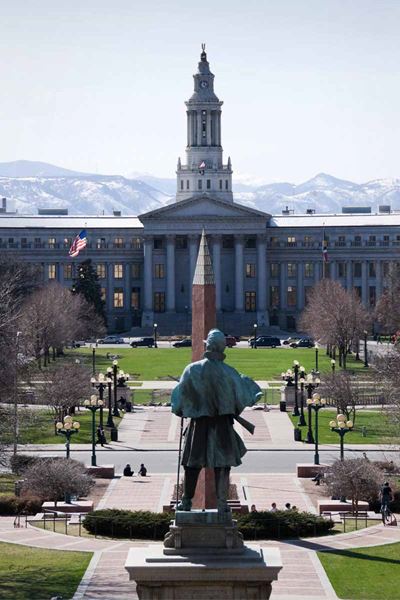Your trips
Organise your trips easily with tabs
London
– Denver
Any date
+ Search
When is the best time to visit Denver?
In general the best time to visit Denver is probably July, when the weather is usually great. The hottest months are June, July, August, while the coldest months are January, February, December.
The best time to visit may differ depending on what you are looking for:
- The best time for a sunbathing holiday is June, July, August. Average maximum temperatures are up to +31°C in July and it has 7 sunny days on average.
- In general, it’s pleasant to walk and do outdoor activities during April - October.
- If you want to avoid wet weather, then your choice is January, February, December with the lowest chance of rain.
Average weather in Denver in different months
This is the average weather in Denver for each month based on historic data:
January, February, April, May, June, July, August, September, October, November, December usually has good weather. Average maximum temperature reaches +31°C during July.
In March the weather is OK. Expect around 8 snowy days, and the precipitation amounts to approximately 34 mm in March.
Climate in Denver
Here is the detailed breakdown of the climate in Denver for each month:
| Jan | Feb | Mar | Apr | May | Jun | Jul | Aug | Sep | Oct | Nov | Dec |
|---|---|---|---|---|---|---|---|---|---|---|---|
| Maximum Temperature | |||||||||||
| +22°C | +26°C | +27°C | +31°C | +34°C | +39°C | +38°C | +38°C | +37°C | +31°C | +26°C | +23°C |
| Average Maximum Temperature | |||||||||||
| +6°C | +8°C | +13°C | +18°C | +22°C | +28°C | +31°C | +30°C | +26°C | +19°C | +12°C | +6°C |
| Minimum Temperature | |||||||||||
| -27°C | -31°C | -23°C | -15°C | -6°C | +2°C | +9°C | +5°C | -10°C | -21°C | -24°C | -32°C |
| Avg. water temperature | |||||||||||
| - | - | - | - | - | - | - | - | - | - | - | - |
| Humidity, % | |||||||||||
| 60 | 59 | 55 | 53 | 57 | 52 | 50 | 52 | 52 | 54 | 58 | 60 |
| Rain, mm | |||||||||||
| 4 | 6 | 25 | 49 | 95 | 63 | 56 | 50 | 40 | 28 | 10 | 3 |
| Snow, mm | |||||||||||
| 22 | 24 | 34 | 26 | 5 | 0 | 0 | 0 | 2 | 14 | 28 | 24 |
| Average wind speed, m/s | |||||||||||
| 2 | 2 | 2 | 2 | 2 | 2 | 1 | 1 | 1 | 1 | 1 | 1 |
| Sunny Days | |||||||||||
| 9 | 7 | 7 | 6 | 4 | 6 | 7 | 7 | 12 | 12 | 10 | 10 |
| Cloud Days | |||||||||||
| 12 | 11 | 10 | 8 | 7 | 6 | 6 | 6 | 6 | 9 | 11 | 12 |
| Rainy Days | |||||||||||
| 1 | 3 | 6 | 10 | 17 | 15 | 15 | 15 | 10 | 7 | 2 | 1 |
| Snowy Days | |||||||||||
| 9 | 8 | 8 | 5 | 1 | 0 | 0 | 0 | 0 | 2 | 7 | 8 |
Average Temperature
Here are the average maximum and minimum temperatures in Denver during the whole year:
The hottest month in Denver is July with average maximum temperature going up to +31°C. The coldest month is January with the lowest temperatures of -7°C.
Humidity
The temperature feels different depending on humidity. Here is how humidity in Denver looks throughout the year, in %:
The most humid month in Denver is December with average humidity going up to 60%. The least humid month is July with an average humidity of 50%.
Rain
Amount of rainfall in mm. in Denver during the whole year based on historical data:
The sunniest and driest month is September with approximately 12 sunny days and a total precipitation of around 40 mm. The rainiest and wettest month is May with approximately 17 rainy days and 95 mm of total precipitation.
Snow
Amount of snow in mm. in Denver during the whole year based on historical data:
The snowiest month is March with approximately 8 snowy days.
FAQ
Frequently asked questions about the weather in Denver:
What is the hottest month in Denver?
The hottest month in Denver is July with average maximum temperature of +31°C.
What is the coldest month in Denver?
The coldest month in Denver is January with minimum temperatures of -7°C.
Is Denver worth visiting in winter?
If you are planning to visit Denver in winter you can expect pretty good weather. The best month is July with +31°C and 7 sunny days.
When does it rain the least in Denver?
if you're looking to visit Denver when it rains the least, you should plan your trip for May, June, July. During this time, rainfall is rare with the driest month being December with only 3 mm of rain.
Other cities in USA
Check out the weather for other cities in USA.
Monthly weather in Denver
Source of the data
For this page, we’ve looked at the typical weather in Denver, based on historical hourly weather data from January 1, 1979, to December 31, 2023.
For past dates, we show actual recorded data at the location at that time. Forecasts are based on recorded weather during that day of the year, averaged over the total years for which we have records (unless stated otherwise). The daily temperature is the highest recorded temperature in the shadow during that day.

